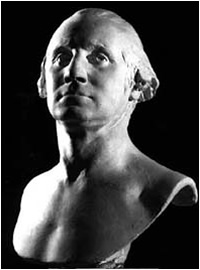| |

 |
|
The Age of Enlightment was a time
of progress, on many scientific areas. Sir Isaac Newton postulated his Laws
of Universal Gravitation, linking celestial and earthy mechanics, and his
three Laws of Motion. Enlighted philosophers and writers as Voltaire and
Rousseau discussed their ideas in chique French salons, while even several
monarchs (including Jozef II of Austria, Frederick II of Prussia, and
Catherina II of Russia) adopted some of their theories in
politics.


Already in
the Renaissance and Baroque periods, there was an interest in the capabilities
of the human mind. An influential philosophical tendency during the Age of Enlightment
was Rationalism. The most important Rationalist was Descartes, by
some called the father of modern philosophy, who challenged the blind
acceptance of Aristotle's ideas. Other well known Rationalists were Spinoza, Malebranche and Leibniz.
In 1776, the United States of
America was declared by the hand of Thomas Jefferson, whom
in that year wrote the American Declaration of Independence - the 13 former British
colonies in North America had separated themselves during the American
Revolution fought from 1775 to 1783.
A Constitution was drawn by the four Founding Fathers, and the
nation was to become a republic. Revolution leader George Washington was
elected first president.


In 1783, following
military defeat, the United Kingdom acknowledged the United
States as an independent state. In 1787, the 13 states sent their
representatives to Philadelphia, where the Constitution for the new nation
was to be written. The United States became a republic, with an elected
parliament and president, adopting Montesquieu's Trias Politica.
The events in North
America enlightened the French bourgeoisie to rebel against the Bourbon
crown, eventually leading to the citizens of Paris to storm the Bastille
prison on the 4th of July, 1789. In 1791, the new French Constitution
was written, which gave the middle class of France more saying in the
government.
However, a year later, radical
revolutionaries established a republic,
murdering King Louis XVI by the guillotine. Their leader, Robespierre, installed
the Terreure. In the name
of freedom, equality, and brotherhood, thousands of people
from France's higher classes were murdered;
palaces and churches devastated. In 1974, Robespierre himself was
killed, and the Directoire government was installed one year later.
In the midst of political chaos, the young army general
Napoleon Bonaparta saw his chance to rise to power, installing himself as
absolute ruler on the verge of the 19th century, in 1799.
18th century philosophy was mainly
inspired by the French Revolution's principles of freedom, equality, and
brotherhood. The new French constitutional was based upon the theories and
ideas of the French philosopher Rousseau. Locke, Hume, and Berkely were
three other influential
British Empiricism philosophers of the time.
|
|
|
 |
![]()